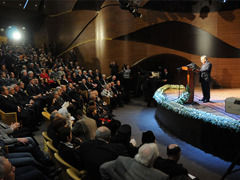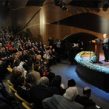
Azerbaijan’s Public Diplomacy Vis-à-Vis Russia
Publication: Eurasia Daily Monitor Volume: 7 Issue: 23
By:

Azerbaijan recently achieved a major public diplomacy success in late January by organizing the first Russian-Azerbaijan Humanitarian Forum in Baku, which assembled more than 100 representatives of the Russian intelligentsia. Rectors of universities, heads of news agencies, high profile journalists and writers, composers and artists, government officials, State Duma deputies and representatives of NGO’s and think tanks from throughout Russia visited Baku for what was described as an “initiative of Presidents Aliyev and Medvedev” (Trend News Agency, January 23). The delegation from Russia was led by the Head of the Presidential Administration, Sergey Narishkin, and the Culture Minister Alexander Avdeyev.
A wide range of issues was discussed during the three day forum, including the activities of the Azerbaijani diaspora in Russia, the Karabakh conflict and the role of Russia in the peace process, as well as regional security matters, exchanging cultural and scientific experience, and further steps toward strengthening bilateral relations. Russian delegates also visited various state and non-governmental institutions in Baku, held talks with their Azerbaijani counterparts and enjoyed sightseeing opportunities. President Ilham Aliyev met with the Russian delegation and highly praised the current level of Russian-Azerbaijani relations. “This forum serves the purpose of expanding our bilateral relations in all spheres, including the cooperation in the humanitarian field. Russian-Azerbaijani relations are developing dynamically and there is a need to involve the representatives of civil society and mass media in this process,” stated President Aliyev at the meeting (Azertaj News Agency, January 23).
Sergey Narishkin also pointed to the growing ties between the two countries and expressed his thanks for this event being hosted in Baku: “Russia highly values the strategic and mutually beneficial relations with Azerbaijan. This forum showed that we need each other and we should continue our close ties” (www.day.az, January 23). Other Russian visitors also lavished praise on the forum, and expressed their desire to continue attending such events in the future. Vitaly Ignatenko, the Director-General of ITAR-TASS news agency said, “We enjoyed this interaction very much. Even in Moscow, it would be so hard to gather all these people. We need to continue such forums in the future” (www.day.az, January 23). The Chief Editor of Ekho Moskvy, Alexei Venediktov, added: “The growth and dynamism of Baku is impressive. We need to create a stable informational exchange. We need to have more Azerbaijani news in Russian media. We should explain to the Russian viewer what is happening in Azerbaijan” (Trend Life, January 22).
Indeed, one of the goals of the event was to increase the understanding of Russian policy-makers and civil society about the realities of both Azerbaijan and the broader South Caucasus region. Azerbaijan, as the strongest economic power and the most stable country in the region, prides itself on its achievements and wants to draw Russian attention to its successes. Azeri policy-makers believe that by increasing the level of knowledge among the Russian elite about their country, Azerbaijan might secure vital support on the Karabakh conflict and break the decade-long stereotype that Moscow does not want peace in the region. A stable, prosperous and friendly Azerbaijan is good for Russia and its southern borders, analysts in Baku believe.
The Karabakh conflict was one of the main topics in the forum’s agenda. Ramiz Mehdiyev, the Head of the Azeri Presidential Administration called upon Russian media representatives to correctly report on the conflict. “This conflict must be resolved within the territorial integrity of Azerbaijan. All world powers have recognized the territorial integrity of our country,” Mehdiyev explained (Trend News Agency, January 22).
Indeed, the latest round of negotiations between the Armenian and Azerbaijani presidents has left Baku frustrated, although the Russian President Dmitry Medvedev has been active in the mediation process, personally hosting the two leaders on a number of occasions. Baku still regards with suspicion the lack of pressure on Armenia to return the occupied Azerbaijani territories and accuses the international community of double standards. The next Azeri-Armenian presidential summit is scheduled to be held in Sochi, in the presence of President Medvedev. There is no doubt in Baku that the key to the solution of the conflict lies in Moscow, and thus such public diplomacy efforts are very timely for Azeri diplomacy.
“The Russian-Azerbaijani Forum has demonstrated how important it is to discuss painful issues from time to time. This forum will play a significant role in development and strengthening of friendship between our nations,” concluded Mehdiyev at the closing ceremony (www.day.az, January 23).




